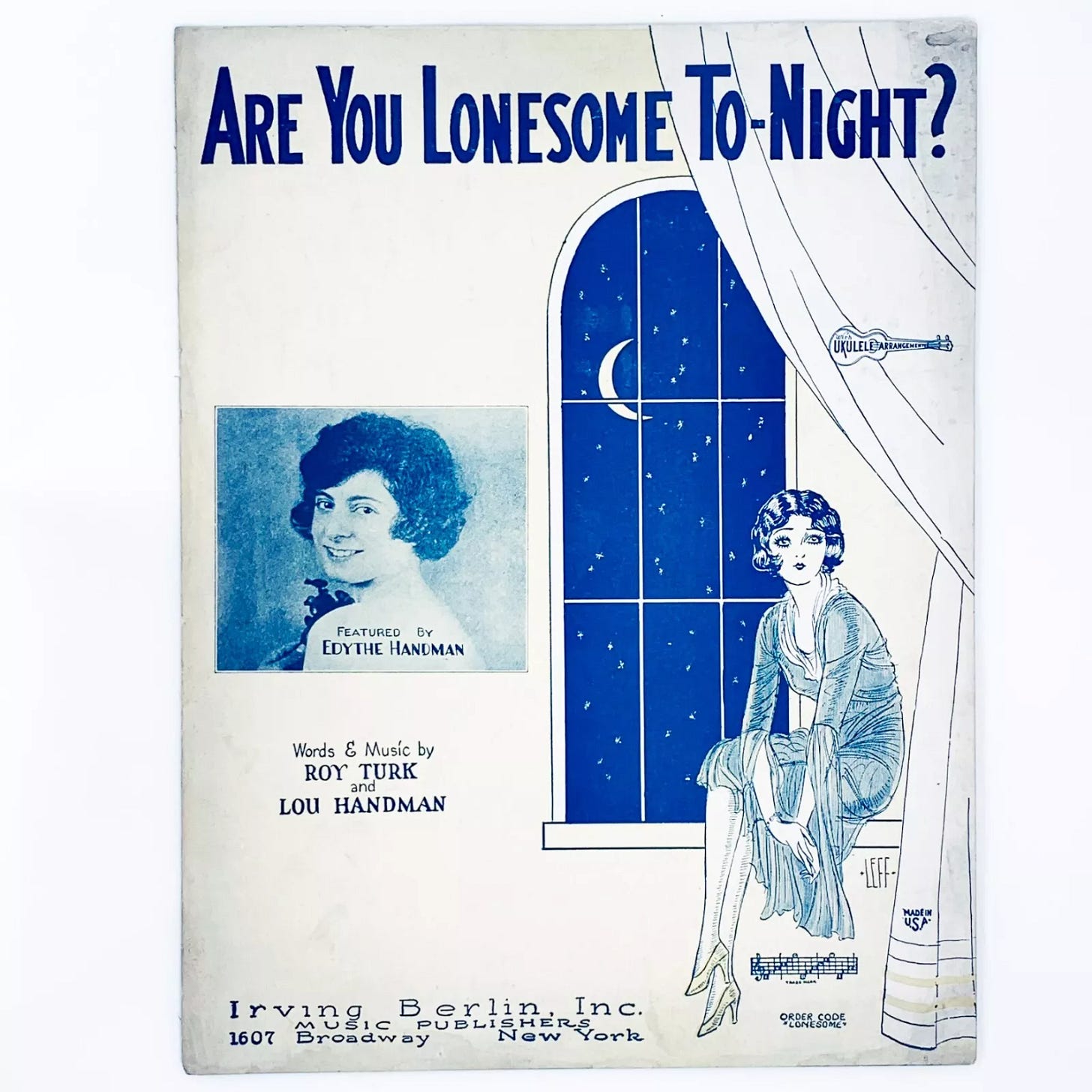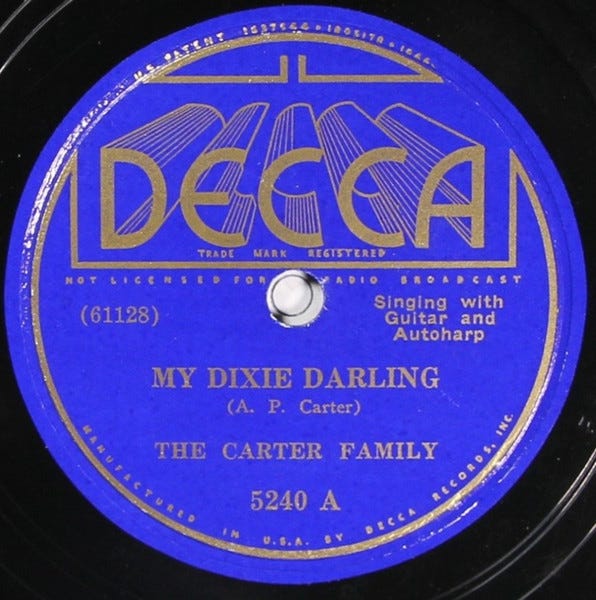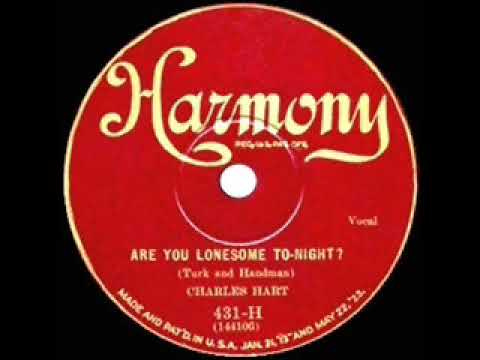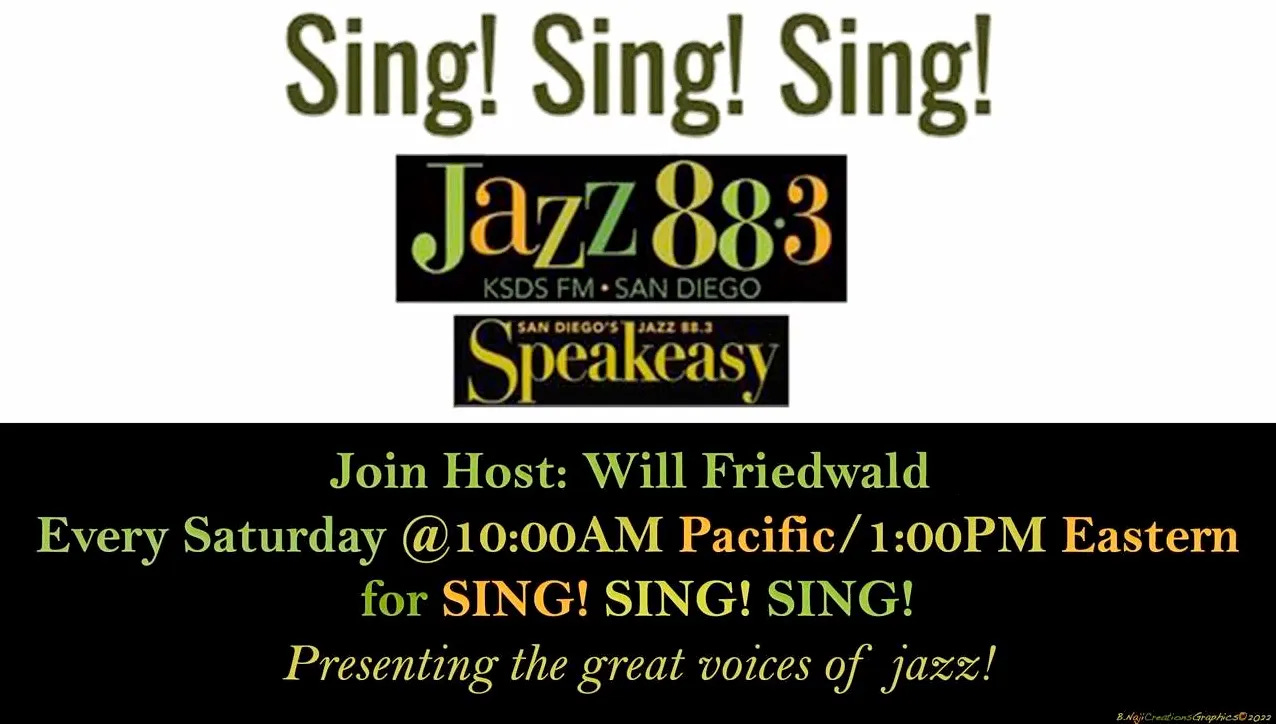"Are You Lonesome To-Night?" (Part 1)
“Do the chairs in your parlor seem empty and bare? / Do you gaze at your bald spot and wish you had hair?”

Part 1: 1926-1936
“Are You Lonesome To-Night?” is one of the major songs of the 1920s that everybody knows - but only because of a recording made in 1960. This is, it turns out, a song that has always been at the nexus of cultural and generational shifts - that is true of the moment when the song was brand new, then again when it turned 25, and again ten years after that when it was revived for new audiences.
Nearly everyone knows the song thanks to Elvis Presley, who first sang it in 1960 and then essentially kept it in his act for the remainder of his career. Even in the 21st century, this song is anything but obscure: Andrew Hickey covered it in his excellent podcast series, A History of Rock Music in 500 Songs (which I wrote about enthusiastically in The New York Sun). Malcolm Gladwell also devoted a whole episode of his own terrific podcast series, Revisionist History, in which he essentially uses the song as a conduit through which to psychoanalyze Presley. I love both of these writer/podcasters, even while admitting that pre-rock pop music is far from their specialty. Likewise, I also freely admit that I don’t know that much about classic rock and/or the many diverse topics that Mr. Gladwell covers, and that I learn a great deal every time I read or listen to them. I also wholeheartedly agree with Mr. Hickey’s contention that Elvis’s immediate post-Army sessions from 1960, especially this song, constitute some of his absolute best work. I do encourage you to check out their takes on “Are You Lonesome To-Night,” although my own perspective is obviously different.
To generations that grew up with the Elvis record - especially Mr. Hickey and Mr. Gladwell - it doesn’t seem the least bit unusual that “Are You Lonesome To-Night?” includes a spoken recitative right in the middle of the song. But from any viewpoint, this one factor alone makes the song very odd indeed. To state the obvious, this is highly unusual for any popular song not attached to a work of musical theater.
The Authors:


“Are You Lonesome To-Night?” was written by composer Lou Handman (1894-1956) and lyricist Roy Turk (1894-1934). It’s safe to say that, over the very long term, this was Handman’s most successful song. He has some other choice entries in his catalog: “Me and the Moon” was wonderfully recorded by both Jimmie Lunceford’s Orchestra and Bing Crosby, and I have a soft spot for “Remarkable Girl” as performed by Ted Weems - not to mention the Willem Breuker Kollektief. Then there are his novelties, “Two Ton Tessie,” immortalized by Ray Charles, and “Puddin’ Head Jones,” which he obviously named after me. Which brings us to no less than three real beauties associated with Cliff “Ukulele Ike” Edwards: “Lovey Came Back,” “It’s All the Same To Me,” and “I Can’t Get the One I Want.” Most of you will also know “My Sweetie Went Away” - one of many of Handman melodies with words by Roy Turk - which Bessie Smith put on the permanent musical map, and which became well known to jazz buffs as a quote source for Lester Young, most famously in “Sometimes I’m Happy.”
By and large, most of Handman’s songs are known only to ‘20s jazz and pop aficionados. Contrastingly. Roy Turk, who was only 42 when he died, wrote a great many more songs that became standards - or close to it - especially with his later partner Fred Ahlert. I’m sure everyone reading this is very familiar with: "I'll Get By (as Long as I Have You)," "Mean to Me," "I Don't Know Why (I Just Do)," “Gimme a Little Kiss, Will Ya, Huh?, “How Many Times,” “I’ll Follow You,” and Bing Crosby’s longtime theme song, "Where the Blue of the Night (Meets the Gold of the Day)." In 1950 and ‘51, Nat King Cole made singularly wonderful records of both “After My Laughter Came Tears” and “Walkin' My Baby Back Home.” And then there’s my favorite couple, “Aggravatin’ Papa” and “Beale Street Mama.” (Loved him, hated her.)
By comparison, it’s easy to say that “Lonesome” is by far the most popular song by Handman, but, in terms of Turk’s output, there’s more competition.
The Song: Music & Words, harmony, melody, structure.
If you were hearing “Are You Lonesome To-Night?” for the first time, you might not realize that it was written as late as 1926. The song clearly sounds like the product of a significantly earlier era, not later than the WW1 period. It would be unfair to compare “Lonesome” to the supercharged, more sophisticated songwriters who were then taking the American popular song to whole new levels, like George & Ira Gershwin, Richard Rodgers & Lorenz Hart, Jerome Kern, and even Cole Porter.
In and of itself, “Lonesome” sounds like something that Irving Berlin might have written around 1913 - a very old fashioned romantic waltz - a sob song if not a proper torch tune. (In fact, “Are You Lonesome To-Night?” was originally published by Irving Berlin Music. ) At the same time, there’s nothing about the song to suggest the Jazz Age - it’s hard to believe it’s from the same period as the snappy, peppy, and highly syncopated songs of, say, Walter Donaldson, Richard Whiting, or DeSylva, Brown, and Henderson.
In terms of the song’s musical make-up, Daniel Weinstein tells us the following:
Musically, the song was (probably purposefully) an old-fashioned waltz even in 1927, but there was certainly an audience for such nostalgic sounds, then and even later (see Blue Barron.) The use in the melody of the Major 7th to 6th, twice, in the 3rd and 4th bars of the first A section, is the one musical element that could be seen as slightly more modern. That Major 7th to 6th move became a cliché for endings of songs by "sweet" dance bands all through the 1930s. There are any number of sweet band records, and hot bands playing sweet, that end with the Major 7th to 6th move.
The same melody notes in the second 8 bar section become the 4th and 3rd of the underlying (dominant or 5) chord. The 4th would be considered a "suspension" which is resolved when it moves to the 3rd of the chord. The entire song is well constructed, but (of course) hardly revolutionary!
The basic song is a four-bar intro, followed by a longish 16 bar verse, for which there are two sets of lyrics, as follows:
Verse 1:
Tonight I’m downhearted,
For though we have parted,
I love you and I always will.And while I’m so lonely,
I’m writing you only,
To see if you care for me still.Verse 2:
I hold with affection,
A fond recollection,
A romance of days gone by.And often I wonder,
If I made a blunder
By letting you bid me “Goodbye.”
Then, there’s the central chorus, which is essentially in the familiar 32-bar AABA form, with some variations:
The Song Form:
FIRST A SECTION:
Are you lonesome tonight?
Do you miss me tonight?
Are you sorry we drifted apart?SECOND A SECTION (Really A’ - (or A', since the 1st half of the 8 bars has the same melody but over different chords.)
Does your memory stray
to a bright summer day
When I kissed you and called you sweetheart?B SECTION OR BRIDGE
Do the chairs in your parlor
Seem empty and bare?
Do you gaze at your doorstep
And picture me there?THIRD A SECTION (Actually A’’ - since the first 2 bars are the same as A but the last 6 bars are different)
Is your heart filled with pain,
Shall I come back again?
Tell me dear, are you lonesome tonight?
The Recitation:
The song only requires two pages, but there’s something rather curious on the inside front cover. It’s designated “recitation” and it contains 12 lines of verse that are meant to be spoken rather than sung.
There’s a long history of spoken passages within otherwise sung recordings: as Dan Levinson points out, Esther Walker chants and recites a patter section in her 1919 disc of “Blues My Naughty Sweetie Gives to Me,” and numerous Jewish entertainers, especially from the vaudeville tradition, like Al Jolson (as on “Here I Am,” 1926, and “Mother of Mine,” 1927), Sophie Tucker, and Harry Richman, occasionally recited a portion of the lyrics rather than singing it - in Tucker’s music, the two are so close together that it’s barely worth distinguishing between the two.
Yet “Are You Lonesome To-Night?” (1926) may be a first - or certainly a very early example - of a song with a passage that is specifically written to be recited and not sung.
And what’s especially surprising is the general tone and even content of that recitation. The major refrain is a fairly standard lament of lost love; the bridge places the song in your average house with your average chairs in your average parlor - this is an every person’s love song, an experience that could happen to anybody. But the recitation brings in all these showbiz metaphors, some of which allude to the opera Pagliacci as well as to the “All The World’s a Stage” monolog from As You Like It.
Why does this recitation get all preoccupied with these “broken clown” metaphors that have nothing to do with the rest of the song? And why is the monologue even there at all? Perhaps ironically, the sung portion of the song feels much more natural than the spoken part.
“Are You Lonesome Tonight” points the way to songs that go all in on the showbiz / Pagliacci metaphor, particularly “Laugh, Clown, Laugh” (1928) and the comparatively lesser-known “Broken-Hearted Clown” (1937), which, alongside “The Bluebird of Happiness” (1934) all have a spoken recitation. (I’ll discuss those further in a future SubStack.) And in a few notable cases, like Judy Garland’s “You Made Me Love You,” spoken recitations were added to pre-existing songs.
Here’s the recitation as published in the original sheet music - as we’ll see in the second part of our look at this song, as far I know, it has never been recorded in it’s entirety:
Someone said “The world’s a stage - and each must play a part.”
Fate had me play a lover - with you as my sweetheart.
Act number one was where we met - and I loved you at first glance.
I thanked the author for that part - and for giving me the chance.You read your lines so cleverly - you never missed a cue.
I was the happiest person on earth - but then there came act two.
You seemed to change - you acted strange - but why? - I’ve never known.
Then came the day you went away - and left me all alone.If you lied when you said you loved me - I had no cause to doubt you.
For I’d rather go one hearing your lies - than to go on living without you.
The stage is bare - and I’m standing there - in the part of a broken clown.
And if you don’t want to come back to me - they can ring the curtain down.
The Original Recordings, 1927-’28
The song was widely recorded in 1927 - by dance bands as well as “personalities,” which was ‘20s record industry jargon for solo singers. Most of the vocal versions, including Charles Harrison and Charles Hart start with the first verse. Vaughn DeLeath, who was recording for Edison Records - which used slightly different technology and had a slightly longer playing time - is one of the few vocalists to sing both verses and the full chorus twice. (Hart does also sing the second verse.)
Charles Hart (tenor with orchestra) on Harmony, supposedly the premiere recording - which I have placed above, at the top of this post. Below is Charles Harrison on Banner. Charles Harrison (another tenor with orchestra named Charles, who also sings both verses - see label above.)
Vaughn DeLeath (soprano with piano - hey, that rhymes!) Also both verses.
Other period singers - including Henry Burr (Tiny Tim’s favorite) and Frank Munn also recorded it. I’m not listing all the 1927-’28 recordings, but it seems proper to include at least one early dance band version. The Newport Dance Orchestra, recording for Diva, plays it the fastest I’ve ever heard, as a snappy-peppy 2/4 foxtrot rather than a waltz. (The vocalist is Irving Kaufman.) Well, it’s different!
So far, I can’t find any early American recording that includes any part of the recitation. However, there is a British version, on an 8” bargain basement disc, by a tenor named Stanley Kirkby, who seems to be the approximate British counterpart to the likes of Irving Kaufman.
Kirkby starts with verse 1, sings the full chorus, and then, rather surprisingly - after having listened to all the American versions - he gives the monolog, but only the second half of it, starting “You seemed to change - you acted strange - but why? - I’ve never known.” To conclude, he follows the instructions in the published sheet music: “At the end of recitation, sing the last two lines of chorus as follows: “Is your heart filled with pain? / Shall I come back again? / Tell me dear, are you lonesome tonight?”
One last 1927 version: This isn’t particularly good, but it’s interesting to hear “Lonesome” sung by a duo, one of those numerous tenor-baritone combinations inspired by Billy Jones & Ernest Hare, The Happiness Boys. (The song was also recorded in England by the African-American duo of Turner Layton and Clarence "Tandy" Johnstone, but I have been unable to locate that track.)
Retro as it was, ““Are You Lonesome To-Night?” was certainly one of the more popular songs of 1927 - alas there’s no accurate metric of how many records it actually sold. (I keep promising to run my story on the late Joel Whitburn). Still, as I say, the sheer quantity of different recorded versions - at least ten in 1927 - is certainly an indication that the song can be safely described as a hit. (There even was a French version, by Lud Gluskin, recorded in Paris in 1928 that I would love to hear.)
1936: The Carter Family


The only major recording of “Lonesome” that I know of between 1928 and 1950 - that I know of - was made in 1936 by the Carter Family. It’s also the absolute strangest version. A. P. Carter, the family patriarch, was notorious for grabbing copyrights of songs that other people had written, but this must be on the most extreme examples of Carter appropriating a very well-known Tin Pan Alley song that had been formally published and widely recorded. (He seems to have more sheer chutzpah than he had talent.) The Carter Family version includes nearly all of the Handman-Turk song but incorporates other material is well. It’s sort of half the 1927 song and half something composed by Carter - or stolen from someone else. And yes, Carter is the only one credited as composer. Roy Turk had died in 1934, but I can’t imagine why Lou Handman and the publisher, Irving Berlin Music, didn’t take legal action.
Are you lonesome tonight, do you miss me, I say
Are you sorry we drifted apart
Does your memory cling to that bright summer day
When I kissed you and called you sweetheartLike a rose on the vine I am clinging to you
As I did when we drifted apart
I am wishing you back to that little shack
Where I kissed you and called you sweetheart[INSTRUMENTAL BREAK]
Does the chair in your parlor seem empty and bare
Do you miss me and wish I was there
Is your heart filled with pain, shall I come back again
Tell me, darling, are you lonesome tonightAre you lonesome tonight, do you miss me, I say
Are you sorry we drifted apart
Does your memory cling to that bright summer day
When I kissed you and called you sweetheart[INSTRUMENTAL BREAK]
I have counted the days, I have counted the nights
I've counted the months and the years
I have counted on you since we've drifted apart
Tell me, darling, are you lonesome tonightAre you lonesome tonight, do you miss me, I say
Are you sorry we drifted apart
Does your memory cling to that bright summer day
When I kissed you and called you sweetheart?
Stay Tuned for Part Two: Blue Barron, Al Jolson, Elvis Presley, Sam Kinison & others.
Special thanks to Elizabeth Zimmer, as always, not to mention Dan Weinstein, Robert Isaiah, Lawrence Schulman, and Michael Lavine.
Sing! Sing! Sing! : My tagline is, “Celebrating the great jazz - and jazz-adjacent - singers, as well as the composers, lyricists, arrangers, soloists, and sidemen, who help to make them great.”
A production of KSDS heard Saturdays at 10:00 AM Pacific; 1:00PM Eastern.
To listen to KSDS via the internet (current and recent shows are available for streaming.) click here.
The whole series is also listenable on Podbean.com; click here.
SING! SING! SING!
SSS 123 2024-11-23 The Harry Warren & Johnny Mercer Songbook, Part 1 - with Vanessa Racci & Robert Lamont
download: <or> play online
"Uncle Sam Blues - The Best of V-Discs"
(SSS #122 2024-11-16 )
Download <OR> Play Online
SLOUCHING TOWARDS BIRDLAND is a subStack newsletter by Will Friedwald. The best way to support my work is with a paid subscription, for which I am asking either $5 a month or $50 per year. Thank you for considering. (Thanks as always to Beth Naji & Arlen Schumer for special graphics.) Word up, peace out, go forth and sin no more! (And always remember: “A man is born, but he’s no good no how, without a song.”)
Note to friends: a lot of you respond to my SubStack posts here directly to me via eMail. It’s actually a lot more beneficial to me if you go to the SubStack web page and put your responses down as a “comment.” This helps me “drive traffic” and all that other social media stuff. If you look a tiny bit down from this text, you will see three buttons, one of which is “comment.” Just hit that one, hey. Thanks!
Slouching Towards Birdland (Will Friedwald's SubStack) is a reader-supported publication. To receive new posts and support my work, consider becoming a free or paid subscriber.







I don't know how common the blunder/wonder rhyme is, but it also appears in another song by Handman, albeit with Grant Clarke and Edgar Leslie, "Blue and Broken Hearted". The lines are:
We made a blunder, and sometmes dear I wonder /
If you're blue too.